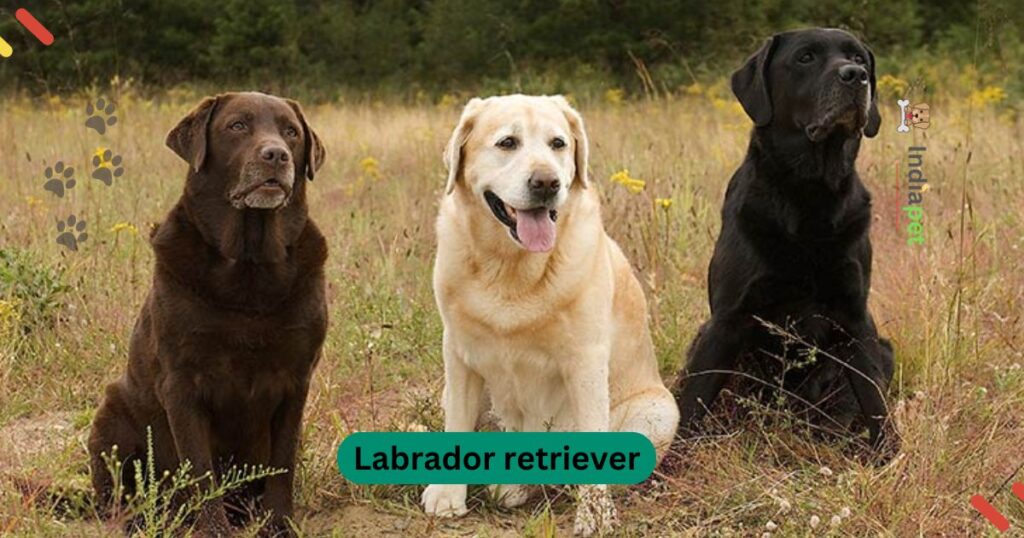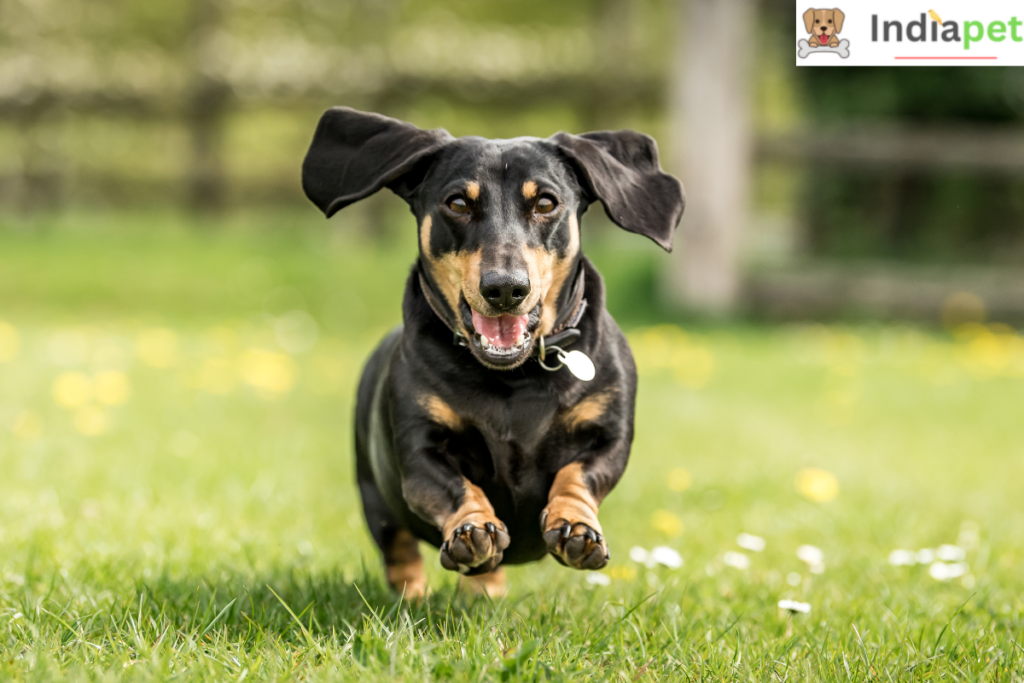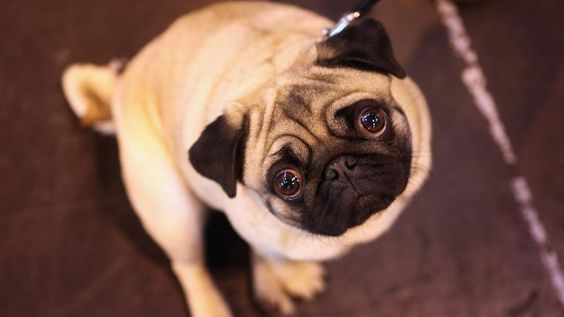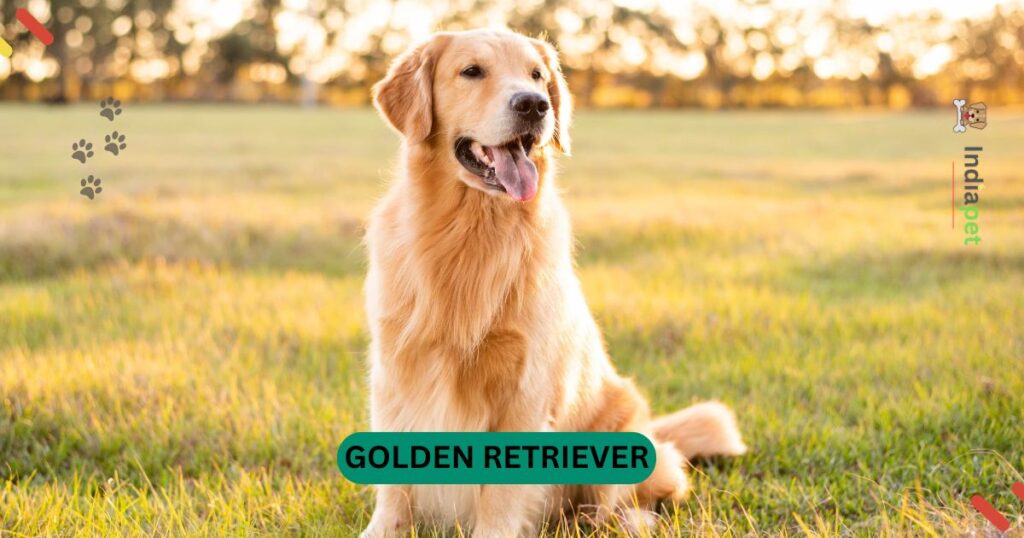Maintaining a healthy weight is vital for dogs to live long and happy lives. However, some breeds are more prone to weight gain than others due to their genetics, metabolism, and, often, their love of food.
This blog will explore the Dog Breeds Prone to Weight Gain notorious for their tendency to pack extra pounds if not carefully managed.
Dog Breeds Prone to Weight Gain

Labrador Retriever
| Category | Details |
|---|---|
| Breed Name | Labrador Retriever |
| Origin | Canada (Newfoundland) |
| Size | Medium to large; males: 65-80 lbs, females: 55-70 lbs |
| Temperament | Friendly, outgoing, intelligent, and eager to please |
| Coat | Short, dense, water-resistant coat; colors: black, yellow, chocolate |
| Lifespan | 10-12 years |
Labrador Retrievers are known for their friendly nature and boundless energy. However, they are also notorious for their love of food, which can lead to weight gain if their diet and exercise are not closely monitored.
Beagle
| Category | Details |
|---|---|
| Breed Name | Beagle |
| Origin | England |
| Size | Small to medium; typically 20-30 lbs |
| Temperament | Friendly, curious, merry, and sociable |
| Coat | Short, dense, and weather-resistant; colors: tri-color, lemon, red, etc. |
| Lifespan | 12-15 years |
Beagles have a strong sense of smell and a voracious appetite, making them prone to overeating when given the chance. Their affectionate nature often makes them overindulge in food and drink, causing them to gain weight over time.
Dachshund
| Category | Details |
|---|---|
| Breed Name | Dachshund |
| Origin | Germany |
| Size | Small; typically 16-32 lbs depending on the variety (standard or miniature) |
| Temperament | Clever, curious, courageous, and playful |
| Coat | Three types: smooth, long-haired, and wire-haired; colors vary (red, black, tan, etc.) |
| Lifespan | 12-16 years |
Dachshunds have long bodies and short legs, which can make them prone to gaining weight if they don’t get enough exercise. Their playful behavior can hide their tendency to gain weight, so owners should be mindful of their diet.
Basset Hound
| Category | Details |
|---|---|
| Origin | France, bred for hunting small game, especially hare. |
| Physical Traits | Short legs, long body, droopy ears, loose skin; weighs around 40-65 lbs. |
| Temperament | Gentle, affectionate, loyal, and good with children; can be a bit stubborn. |
| Exercise Needs | Moderate; enjoys daily walks but doesn’t require extensive exercise. |
| Health Issues | Prone to hip dysplasia, ear infections, obesity, and bloat. |
| Lifespan | Typically around 10-12 years. |

Basset Hounds have a laid-back personality and love to move around, which combined with their voracious appetite makes them prone to obesity. Regular exercise and portion control are essential to keep them healthy.
Pug
| Category | Details |
|---|---|
| Origin | Low to moderate; enjoys short walks and playtime but is not overly active. |
| Physical Traits | Small, compact, with a wrinkled face, short muzzle, curled tail; weighs 14-18 lbs. |
| Temperament | Playful, affectionate, charming, and good with children; tends to be sociable. |
| Exercise Needs | Low to moderate; enjoys short walks and playtime, but not overly active. |
| Health Issues | Prone to breathing problems (brachycephalic), eye issues, obesity, and hip dysplasia. |
| Lifespan | Typically around 12-15 years. |
Pugs are known for their wrinkled faces and charming personalities. However, their love for food and tendency to become less active as they age make them prone to obesity. It is important to monitor their diet and ensure regular exercise.
Shih Tzu
| Category | Details |
|---|---|
| Origin | Tibet/China, bred as a royal companion. |
| Physical Traits | Small, long coat, flat face, 9-16 lbs. |
| Temperament | Affectionate, friendly, and loyal. |
| Exercise Needs | Low; enjoys short walks and playtime. |
| Health Issues | Brachycephalic syndrome, eye, and ear problems. |
| Lifespan | 10-16 years. |
Shih Tzus are affectionate and friendly companions, but they can easily become overweight if their diet is not properly managed. Their small size and low exercise needs make them susceptible to weight gain.

Cocker Spaniel
| Category | Details |
|---|---|
| Origin | United Kingdom, bred for bird hunting. |
| Physical Traits | Medium-sized, silky coat, long ears, 20-30 lbs. |
| Temperament | Friendly, affectionate, energetic, and playful. |
| Exercise Needs | Moderate to high; enjoys long walks and playtime. |
| Health Issues | Prone to ear infections, hip dysplasia, and eye problems. |
| Lifespan | 12-15 years. |
Cocker Spaniels are known for their beautiful coat and gentle temperament. However, they are prone to gaining weight if their diet is not monitored, as they tend to overeat.

Rottweiler
| Category | Details |
|---|---|
| Origin | Germany, originally bred for herding and guarding. |
| Physical Traits | Large, muscular, short coat, black with rust markings; 80-135 lbs. |
| Temperament | Loyal, confident, protective, and intelligent. |
| Exercise Needs | High; requires daily exercise and mental stimulation. |
| Health Issues | Prone to hip dysplasia, heart issues, and cancer. |
| Lifespan | 8-10 years. |
Rottweilers are powerful and muscular dogs known for their loyalty and protective nature. They are prone to weight gain if they do not receive enough exercise to match their substantial size and strength.
Golden Retriever
| Category | Details |
|---|---|
| Origin | Scotland, bred for retrieving game during hunting. |
| Physical Traits | Medium to large, dense golden coat, 55-75 lbs. |
| Temperament | Friendly, intelligent, and loyal; great with families. |
| Exercise Needs | High; requires regular exercise, such as walks, running, or swimming. |
| Health Issues | Prone to hip dysplasia, cancer, and heart issues. |
| Lifespan | 10-12 years. |
Golden Retrievers are friendly, intelligent, and active dogs that require regular exercise to maintain a healthy weight. Their love of food and tendency to overeat can lead to obesity if not properly managed.
Bulldog
| Category | Details |
|---|---|
| Origin | United Kingdom, originally bred for bull-baiting. |
| Physical Traits | Medium-sized, muscular, wrinkled face, short nose; 40-50 lbs. |
| Temperament | Gentle, calm, loyal, and good with children. |
| Exercise Needs | Low to moderate; enjoys short walks but not overly active. |
| Health Issues | Prone to breathing problems (brachycephalic), hip dysplasia, and skin issues. |
| Lifespan | 8-10 years. |
Bulldogs have a stocky build and a calm demeanor but are prone to obesity due to their lower energy levels and love of food. Monitoring their diet and ensuring they get enough exercise is essential.
Conclusion
While these 10 dog breeds are more prone to weight gain, it is important to remember that any dog can become overweight without proper nutrition and exercise.
As responsible pet owners, we must monitor their weight, provide a balanced diet, and ensure they get enough physical activity to stay healthy and happy.
FAQs about Top 10 Dog Breeds Prone to Weight Gain
How can I tell if my dog is overweight?
You should be able to feel your dog’s ribs without any excess fat. Additionally, a visible waistline when viewed from above and a belly that curves from the side are signs of a healthy weight.
What should I do if my dog is overweight?
Consult your veterinarian for advice on adjusting your dog’s diet and exercise routine. They can recommend a specific weight management plan to suit your dog’s needs.
Is there a specific diet for overweight dogs?
Your veterinarian can recommend a weight-management dog food that is low in calories but still provides the necessary nutrients.
How much exercise do these breeds need?
Exercise needs vary by breed and individual dog. Regular walks and playtime are essential to keeping dogs healthy and preventing weight gain.









